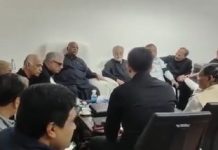Fate of the syndicate
Almost everyone believes that Dubai-based mafia groups, especially the D-Company headed by Dawood Ibrahim, who lives in Pakistan, control illegal betting and match-fixing in the subcontinent and West Asia. Nilay Dutta, a member of the Justice Mudgal committee, was convinced about it. (The Mudgal committee was asked by the Supreme Court to probe the IPL’s match-fixing scam in 2013.)
In his minority report, Dutta claimed that illegal betting “survives and flourishes by the muscle power of the underworld”. He added that the main mafia syndicate involved in the racket was headed by Dawood. His henchmen “intimidated the various actors of this syndicate to comply with their directions. Threats of use of violence were used to settle disputes connected with payments as well as to intimidate players who failed to perform after accepting gifts/girls/money”.
It was the cartels that set the odds for the gamblers. They asked their gangsters to set up a close, but expanded, network of bookies, who interacted with the punters and other betters. Players, umpires, administrators and officials were ‘fixed’ rather directly by the mafia or through the loyal bookies. The updated ‘Bhao and Dabba’ system was used to communicate the odds and receive bets.
Bhao is a wireless link between the mafia and bookies to get the changing odds on a regular basis. Dabbas are mobile phones with modified SIMs that are distributed to the punters and gamblers. These instruments cannot receive calls, but make them to a single pre-programmed number. The better calls this number and an operator on the other end continuously parrots the odds for the various outcomes. To place a wager, the gambler loudly says the amount and the specific bet. It is duly recorded at the other end in a register or Excel spreadsheets.
Like any efficient system, this has a deficiency. In the three-way communication — between the mafia and bookies, bookies and gamblers, and gamblers and bookies — the odds can be set only for a few outcomes. There are two reasons for this. One, it is difficult for the parroting operator to repeat dozens of odds, and give enough time to the gamblers to act. Two, and more important, it is almost impossible for a syndicate to set the odds for each ball and over, get it across to the bookies and receive the bets within the short time of a few seconds and minutes.

Therefore, in the pre-IPL era, the cartels focussed on a few outcomes like runs scored in the first 10-15 overs, total in an innings, highest score by a batsman and a team’s win or loss. Once the bookies added more outcomes to their menu during the IPL and gamblers demanded bets on each ball and over, the syndicates lost their stranglehold. They still decided the odds on the main outcomes, but the bookies and punters had a free hand to woo gamblers on the minor ones.
Perhaps, this explains why Chandila dealt with several bookies, as is evident from the Delhi Police’s transcripts of his calls. He interacted with Chandresh Patel, Bhupender Nagar cartel and Tinku Mandi. He also received money from Deepak Kumar and gifts from Sunil Bhatia. Asad Rauf, the Pakistani umpire, who was charged with sharing information with bookies, received money and gifts from the Jaipur brothers and Prem Taneja (through his brother).
Fix the odds
Two trends emerged from the freedom that the bookies gained. If people increasingly gambled on the minor outcomes, only one-two not-so-known players had to be ‘fixed’. For innings total, win or loss, the mafia had to ensure that at least five-six major players, including the captain preferably, were paid off. This was no longer the case, as the bookies and punters could woo a non-descript bowler or two to give away certain runs in an over, or a batsman or two to get out cheaply.
Sreesanth, Chandila and Chavan played to the new script. They were paid to give away at least 13 or 14 runs in the second over that they bowled in different games during IPL-6. The trio were urged to give pre-determined signals so that their puppeteers could place the bets. The bowlers tried hard to keep their promises. For example, Sreesanth bowled four short-pitched balls and two fuller ones, all of which could be hit for boundaries. In fact, he took his hand away as Adam Gilchrist (Kings XI Punjab) played a fuller one straight down the wicket to give away a boundary.
As each over and ball became important, it had an impact on the nature of betting. The new name of the game was to fix the future odds, and not the match. In the IPL, and any T20 game, one or two overs in the beginning or the end of an innings can significantly influence the end-result. This is evident from the above examples. For instance, Sreesanth’s over provided the momentum to Gilchrist and Shaun Marsh to add 102 runs for the second wicket. Chavan’s over, which yielded 15 runs, including two sixes, helped the batsman to race away to 23 off 12 deliveries.
The fact is that one or two bad overs will change the odds for the bigger outcomes like runs scored in the first 10 overs or innings total. For example, if a team is expected to make 130-140 runs, the chances of it reaching 150 go up if 14-15 runs are scored in the fourth or fifth over. Therefore, the odds for the team to score 130-140 runs, or more than 150, alter immediately. Thus, if someone has fixed an over, he is sure to place his bets in a manner to account for this.
In his book, Bookie Gambler Fixer Spy, Ed Hawkins wrote that the ability to move the odds in a global betting market, legal or illegal, and knowing that it will happen, “is a trick of the gambling gods. At the click of their fingers or a computer mouse, the Indian bookmaker dictates to the rest of the world”.
If a bookie knew how the future odds will change in any match, be it cricket or football, his opportunities to earn huge profits multiply.
If someone like Pushkar, who possibly had inside knowledge, threatened to expose the new dynamics of illegal betting, she had to be silenced. Any stakeholder in this illegal trade, be it the mafia, bookies, punters or individuals involved in the IPL, could be involved.
letters@tehelka.com













